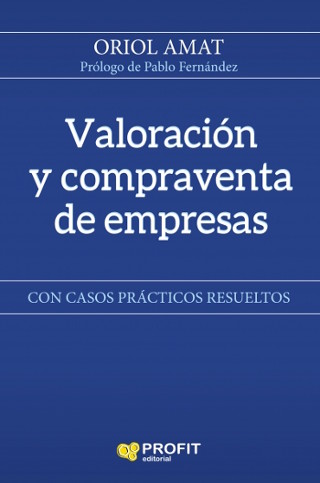Oriol Amat publishes “Valoración y compraventa de empresas” (Valuation and sale of companies), a complete and practical guide on the analysis and auditing of companies in the process of sale or absorption

Dr. Oriol Amat
Oriol Amat, professor of Financial Economics at Pompeu Fabra University, dean of its Barcelona School of Management and full academician and member of the Governing Board of the Royal European Academy of Doctors-Barcelona 1914 (RAED), has published “Valoración y compraventa de empresas” (Valuation and sale of companies) (Profit), a complete and practical guide on the analysis and auditing of companies in the process of sale or absorption. A work that complements the recognized “Detecting accounting fraud before it’s too late” (Wiley) , a reference manual published jointly by the Barcelona School of Management and the Catalan Association of Accounting and Management, which he promoted and presided.
 “The valuation of a company is a subject with many implications, since it depends on the characteristics of the company: activity sector, managers, employees, economic moment… And although it is something that has been practiced for years, errors in valuation reports are very frequent due to misuse of techniques or misinterpretations”, the author points out in the presentation of this new book. “Valoración y compraventa de empresas” teaches those interested in the purchase and valuation of companies the techniques and key concepts to do it correctly, from the initial analysis to the contract of sale, through the due diligence. An entertaining book with a mathematical apparatus reduced to a minimum and a multitude of examples, cases and real anecdotes to make more accessible concepts difficult to understand.
“The valuation of a company is a subject with many implications, since it depends on the characteristics of the company: activity sector, managers, employees, economic moment… And although it is something that has been practiced for years, errors in valuation reports are very frequent due to misuse of techniques or misinterpretations”, the author points out in the presentation of this new book. “Valoración y compraventa de empresas” teaches those interested in the purchase and valuation of companies the techniques and key concepts to do it correctly, from the initial analysis to the contract of sale, through the due diligence. An entertaining book with a mathematical apparatus reduced to a minimum and a multitude of examples, cases and real anecdotes to make more accessible concepts difficult to understand.
 Articulating different methods of analysis that complement each other to shape the analysis, Amat gets the investor to have a vision trustworthy of the society in which you are interested. “It should be noted that the valuation of companies isn’t an exact science since the value of a company as a concrete figure doesn’t exist, it’s rather a range of values of subjective determination and that depend on assumptions about the future. On the other hand, when the buyer and seller agree on the amount for which the sale will be made, it means that they agree on a price and this is an objective fact”, he says.
Articulating different methods of analysis that complement each other to shape the analysis, Amat gets the investor to have a vision trustworthy of the society in which you are interested. “It should be noted that the valuation of companies isn’t an exact science since the value of a company as a concrete figure doesn’t exist, it’s rather a range of values of subjective determination and that depend on assumptions about the future. On the other hand, when the buyer and seller agree on the amount for which the sale will be made, it means that they agree on a price and this is an objective fact”, he says.
The work also addresses the so-called accounting makeup, possibly the problem that most the investor worries, anxious to detect tricks. Hence, the author makes a series of warnings about this possible misleading audit.




